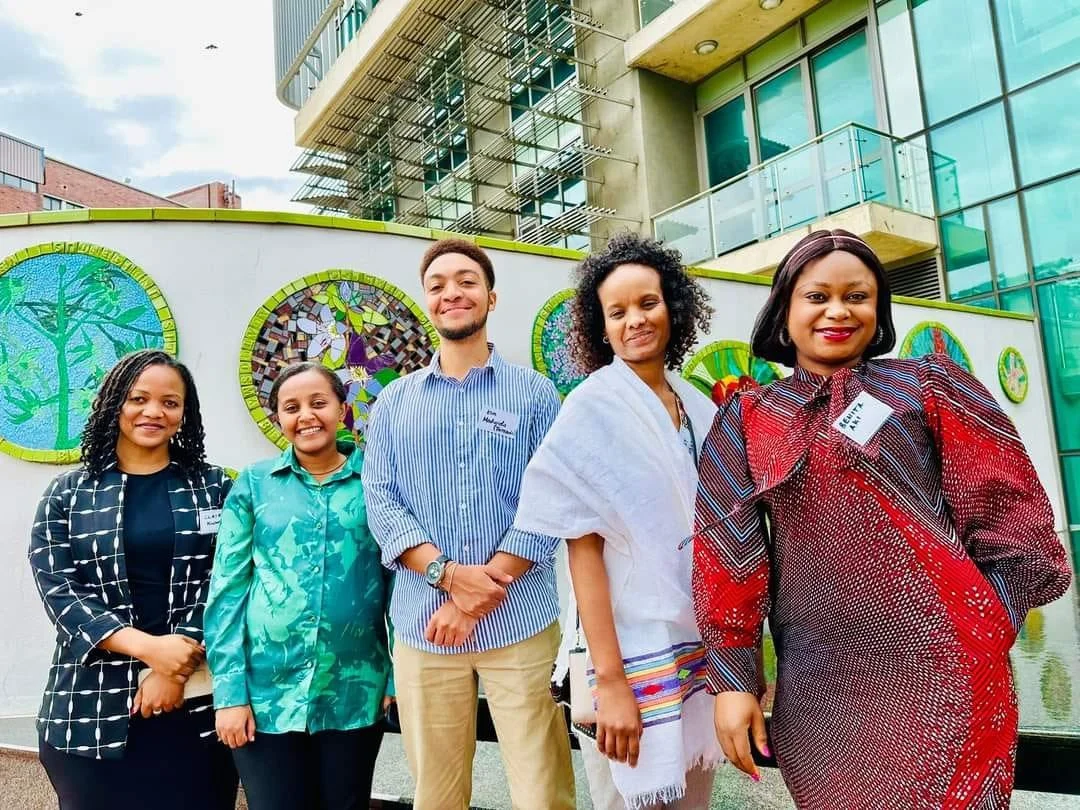Bridging Minds From Across the World
26 February - 1 March 2024
L to R: Claire Kwagala, Selamawit Alemayehu Tessema, Kim Madundo, Tigist Zerihun, Benita Aki
“We need to allow ourselves the space and time to learn and prioritize and decide.”
Dr. Rachel Oblath spoke these words to me during a 30-minute consultation. We had never met before, but I truly resonated with this sentiment. I not only felt understood and seen, but also reassured that a more accomplished professional from a different country could share a similar opinion to mine. This quote helps me summarize my reflections on an expeditious and intensive, yet transformative research training week.
Towards the end of February 2024, I was fortunate enough to attend a week-long gathering of inspirational minds. It was my first time visiting Durban in South Africa. The decision to attend the Psychiatry Research Week at the University of KwaZulu-Natal (UKZN) was somewhat spontaneous. I only knew one person attending this event, who already had connections with many more people there. I did not know what to expect, but I was ready to learn.
It is widely known that mental health needs in Africa are under-addressed. It was, therefore, immensely encouraging to be in the company of emerging and established leaders in mental health from across South Africa, Africa, and beyond. Throughout the week, I learned from and interacted with esteemed researchers and mental health professionals, delving into the intricate layers of local, cross-cultural and global mental health phenomena.
One presentation that I found exceptional was by Prof. Xanthe Hunt who spoke about suicide and mental health among South African youth. It reminded me of the complexity that exists in health systems, and how barriers to care promote creation of opportunities both in research and in improving services. Suicidality is one of my areas of interest in clinical practice and research, and I was inspired to see the expertise and efforts, particularly with the use of technology, to increase access and retention in suicide prevention care.
At UKZN, there was an apparent passion amongst the attendees for advancing psychiatric research. Often, too many questions were asked to be answered in-session. Trainees and specialists with a wide range of understanding shared their insights, looking to support others in the room. The selected presentations catered to the whole group, from introductory- to more advanced-level topics. The discussions were rich, and the spirit of collaboration was undeniable.
Meeting renowned researchers and mental health professionals was an enlightening experience. People who previously existed in my mind only as names on publications were suddenly real people. I was particularly inspired by Profs. Saeeda Paruk and Bonga Chiliza, two of the facilitators of the training. Prof. Paruk shared viewpoints on the preparation for grant writing as a continuous process not bound by any individual grant, which I had never considered before. She explained the importance of intention and a through line in one’s work, and managing expectations. Prof. Chiliza emphasized the strength of collaborations that transcend one’s geographical location, professional background, and comfort zone. This was evident in the existing UKZN-Boston University collaboration which organized and provided facilitators for the event. The salience of mentorship and collaboration was echoed throughout the week. In my experience, these lessons are often not given priority in traditional psychiatric or research training curricula. This only further underscored the necessity for events such as this one.
At UKZN I spent most of my time learning from others, regardless of their level of training, background, or primary location. I attached myself to a group of five Africa Global Mental Health Institute (AGMHI) mentees and sensed solidarity and unity despite our differences in career choices and values. Of course, humour and sarcasm go a long way in building connections with former strangers. For this invaluable experience, I would like to thank the facilitators, presenters, and other attendees for challenging my preconceptions, practice, and goals.
My week-long experience at UKZN proved to be an enlightening and refreshing one. I made sure each encounter had intention. Through these encounters with inspiring individuals, I can now look back with a heightened awareness of my position as part of the bigger picture. As I continue on my path in the field of psychiatry and mental health research, I carry forward the lessons learned and the connections made. I look forward to our contributions to psychiatry research. I will allow myself the space and time to learn, prioritize and decide.
Dr. Kim Madundo is a psychiatrist, lecturer, and early career researcher from Kilimanjaro, Northern Tanzania. He has an interest in trauma, depression and suicidality, intervention development, and psychometric validation. Correspondence: kimmadundo@yahoo.com

